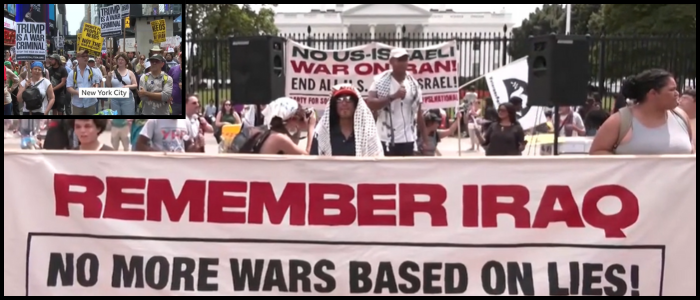Trump called the recent conflict the "12-Day War," and he hoped the ceasefire would represent a turning point. Iran's foreign minister Abbas Araghchi has said Iran would stop its retaliation if Israeli strikes ceased by 4 am local time in Tehran. Israel later confirmed its acceptance of the ceasefire plan, adding that it had reached "historic results" militarily. After the deadline elapsed, reports said Israeli strikes had halted.
But just two hours later, Israel's defence minister accused Iran of violating the cease-fire and issued a warning of retaliation. Iran categorically rejected that it had violated them. The Trump administration is pressing forward apace that the ceasefire holds even as tensions continue.
Iran's Muted Reaction and Position of US
Before the truce, Iran fired missiles at a major U.S. military base in Qatar, as a retaliatory action to Saturday strikes. All the missiles were intercepted, and there were no casualties or damage, according to reports. Afterwards, President Trump addressed the nation, cautioning there would be a strong American response in the event that U.S. interests are attacked again. He also alluded to additional military targets, a sign of pruning willingness but restraint.
via News on Trump: "So far, very bad," the president tweeted on his social media platform, calling Iran's response "very weak," and saying it had been "hit very fast and very hard." He wished that Iran had "gotten the message" and released the anger and could now move "in a more rational direction." Behind the scenes, he worked with Qatari officials and Israeli Prime Minister Benjamin Netanyahu to influence the terms of the cease-fire.
A Pattern of Calculated Risk
It isn't the first time Trump has played such a hand. When the Iranian commander Qasem Soleimani was killed in Baghdad in January 2020, Iran responded with missile attacks on U.S. bases in Iraq that injured more than 100 soldiers. The U.S. did not respond, and tensions abated for a time.
In the most recent episode, Iran reportedly launched a few missiles that equalled the number of bombs dropped by U.S. forces over the weekend. Trump noted that Iran offered prior notice to Qatar, an act that he saw as a sign of attempting to balance rather than aggravate the dispute.
Trump followed developments in the crisis closely, he said, monitoring such matters as oil prices, public reaction and even a suggestion from former Russian President Dmitry Medvedev that Iran would support its nuclear program with nuclear weapons. U.S. officials point out that Trump isn't one of those leaders who makes threats without carrying through.
Although the situation is still fragile, both Iran and Israel appear willing not to escalate violence further. For now, Trump is pulling for a peaceful outcome.
World

Trump's Risky Strikes Could Bring Iran-Israel Peace

U.S. President Donald Trump may have pulled off a daring gamble in entering the intensifying conflict between Iran and Israel. He announced Monday evening that both countries had agreed to a cease-fire , raising the prospect of a more durable peace in the region. The deal followed days of heightened tension after American airstrikes hit Iranian nuclear facilities on Saturday.















